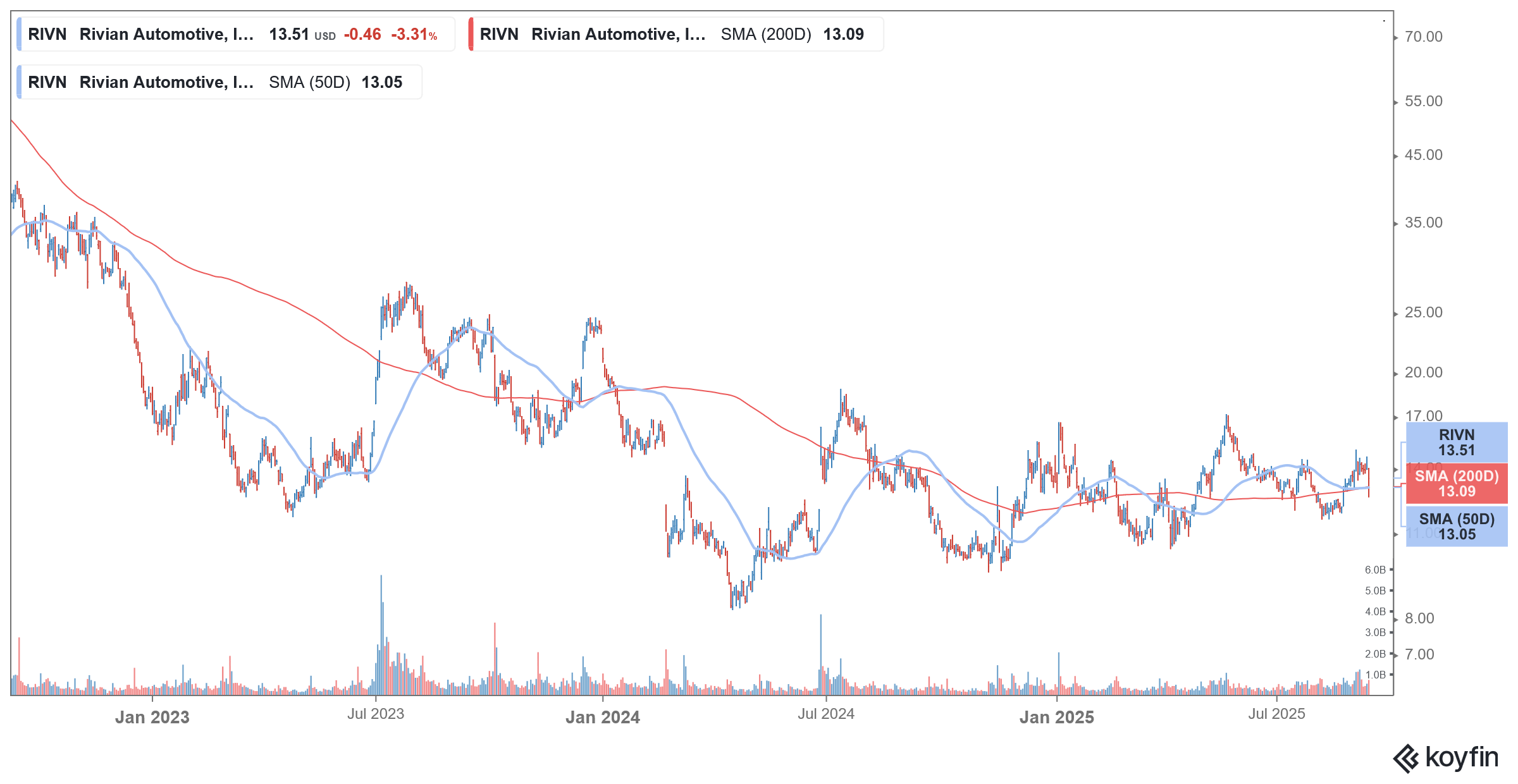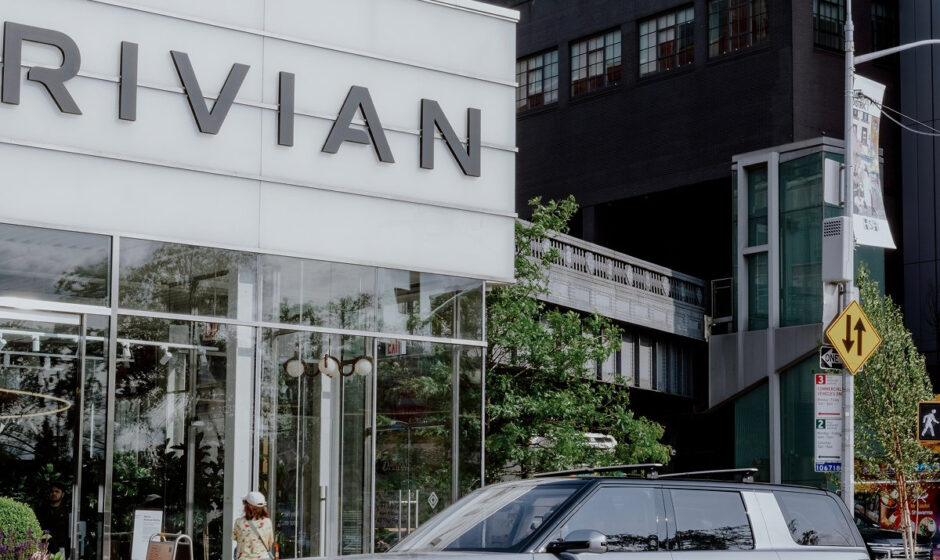Please note that we are not authorised to provide any investment advice. The content on this page is for information purposes only.
Rivian (NYSE: RIVN) stock is trading lower today after the company announced a recall affecting over 24,000 of its 2025 model year R1T and R1S vehicles. The recall is due to a software defect in the “Hands-Free Highway Assist” system, a Level 2 driver-assistance feature.
The software glitch could cause the Highway Assist system to misclassify a leading vehicle, increasing the risk of a crash. According to the National Highway Traffic Safety Administration (NHTSA) documentation, the issue was identified following a field incident in which an R1S experienced a functional limitation at low speeds.
Rivian Recalls Over 24,000 Vehicles
The recall impacts 24,214 R1T and R1S models in the United States and Canada that are running a software version prior to 2025.18.30. Rivian has already addressed the issue with a free over-the-air (OTA) software update, which was released in June. The company said that more than 99% of the affected vehicles have already received this update, while urging the owners of the remaining vehicles to update their software immediately.
This recall comes at a challenging time for Rivian, which is also facing financial pressures and preparing to retool its factory for the production of its upcoming, more affordable R2 model. While recalls are common in the auto industry, the scale of this one—affecting a significant portion of the company’s limited production—highlights the ongoing challenges related to manufacturing and quality control for the young automaker.
Rivian to Begin Construction at Its Georgia Plant
Meanwhile, Rivian is looking to restart work on its planned factory in Georgia from next month. The work was stalled amid the slowdown in the electric vehicle (EV) industry, but Rivian managed to secure a subsidized $6.6 billion loan from the Department of Energy, which it plans to use for the construction of the plant.
The Georgia plant would have an annual nameplate capacity of 400,000 units, and the company announced plans for the facility shortly after its blockbuster IPO in late 2021, which was the largest listing since Facebook’s (now Meta Platforms ) 2012 listing.
Georgia provided a generous $1.5 billion incentive package in 2022, and by October 2023, the site was reported to be 95% graded and nearly ready for construction.
However, in March 2024, Rivian announced a pause in the Georgia plant’s construction. This decision was driven by a strategic move to prioritize the launch of its more affordable R2 SUV, with initial production slated for its existing plant in Normal, Illinois. The aim was to reduce capital expenditure and accelerate the R2’s market entry.
Notably, amid the perennial cash burn, Rivian’s cash pile has come down, and the company made a prudent decision to preserve cash. Moreover, demand for electric cars hasn’t been as strong as expected, and Rivian’s production has fallen for two consecutive years. The company’s 2025 production guidance implies yet another yearly fall in deliveries.


Volkswagen Has Backed Rivian
Prospects of Rivian restarting the Georgia plant brightened last year after German auto giant Volkswagen announced a multi-billion-dollar investment in the company, some of which is linked to its meeting pre-set milestones.
The agreement is expected to bolster Rivian’s financial position and facilitate cost reductions through joint component sourcing. This strategic partnership is crucial for Rivian as it continues its path towards profitability.
During their Q4 2024 earnings call, Rivian said that it expects to realize revenues of $2 billion from Volkswagen over the next four years as their joint ventures deliver on the pre-set milestones. This, Rivian said, would include the cash received from Volkswagen for licensing of intellectual property, coupled with equity premiums and other noncash benefits.
Rivian to Launch R2 Vehicles in 2026
So far, Rivian sells the R1S SUV, R1T pickup, and the electric delivery van. It is, however, pivoting to affordable models, a strategy that Tesla also followed with its Model 3 and subsequently Model Y.
Rivian is set to launch its low-cost platform R2 in the first half of 2026 and previously said that the bill of materials (BOM) for the model would be half of the R1 series of vehicles that it currently sells.
The R2 is designed to be a more compact and affordable alternative to Rivian’s current R1T pickup and R1S SUV. It will start at around $45,000, significantly lower than the R1 models. This price point aims to compete more directly with popular EVs like the Tesla Model Y, which was the best-selling car across EVs as well as internal combustion engine cars last year.
The R2 is critical for Rivian’s long-term success and profitability. By offering a more affordable and mainstream EV, Rivian aims to attract a larger customer base beyond the niche premium segment. Moreover, the model would help drive higher production volumes, which is essential for achieving economies of scale and improving gross margins.
EV Industry Price War
That said, with a flurry of companies working on affordable EV models, the competition in that space is set to intensify. This might lead to an escalating price war as these models compete for market share. There is some economic rationale behind companies cutting prices. For instance, as production volumes increase, manufacturers achieve greater economies of scale. Fixed costs are spread over more units, further reducing the per-vehicle production cost.
As market leader, Tesla cut costs; other players like Rivian are forced to lower prices to stay competitive. However, while Tesla’s profitable and cash-generating operations give it the leeway to cut prices, EV startups are already saddled with losses and cash burn, and the price war is making things only complicated for them.
Trump’s Policies Are a Headwind for EV Companies
President Trump’s policies are not helping the cause of US EV companies, and the EV tax credit is set to expire this month, which could hit adoption, at least in the short term.
The Trump administration has also withdrawn the penalties for non-compliance with emission standards, which basically means that legacy automakers don’t need to buy regulatory credits from EV companies like Rivian anymore. These credits helped Rivian turn profitable, and if not for these, even Tesla would have posted a net loss in Q1 2025. With much of that lucrative revenue stream set to wither away, analysts have also been turning bearish on EV companies.
#Rivian #Stock #Falls #Company #Recalls #Vehicles


